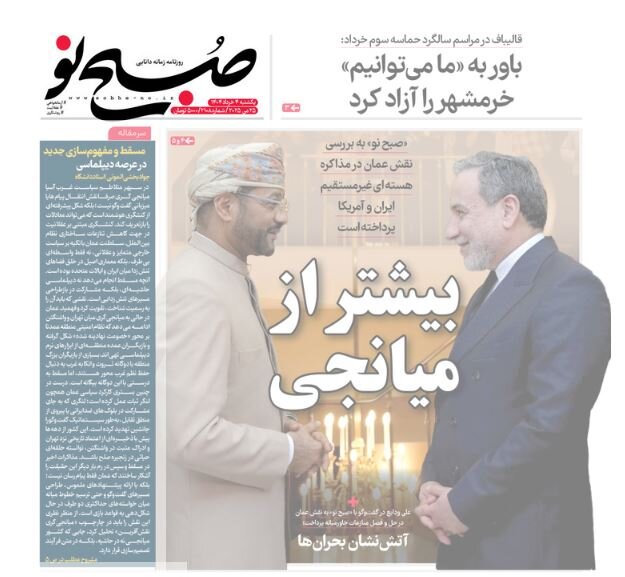Challenging negotiations under shadow of deep differences and new US pressures

TEHRAN - Sobh-e-No called the fifth round of talks between Iran and the U.S. held in Rome on Friday challenging.
It wrote: The fifth round of talks was held while serious differences and unilateral U.S. statements about a complete stop to Iran’s enrichment program had made the atmosphere of the talks challenging and greatly weakened the possibility of holding this round. However, the Omani Foreign Minister pushed the two sides to return to the negotiating table and continue their indirect talks. This round of talks once again showed that the path to reaching a final agreement is still challenging and long, and the role of mediators, especially Oman, is key in maintaining communication channels between Tehran and Washington. An important point to note is the published reports about Witkoff's long meeting with the head of the Mossad, Israel’s spy agency. This meeting indicates coordination and consultation between the U.S. and Israel regarding the nuclear negotiations. Given the prominent role of the Zionist lobby and the Netanyahu government in pressuring Washington, such meetings could affect the U.S. policies in the negotiations.
Resalat: Enrichment is Iran’s inherent right
In an analysis, Resalat addressed the precondition for the negotiations, namely “zero percent enrichment”, which was raised by the American side. The paper said: It is obvious that the U.S. side’s insistence on crossing this red line will lead to the failure of the negotiations and the agreement in principle. In this regard, there is an important legal and technical point that cannot be ignored. Uranium enrichment on an industrial scale is considered an “inherent right” of NPT members, not a “privilege.” Western politicians and media are trying to present a false and incomplete interpretation of this right and, at best, consider it “acquired and waived.” Therefore, American officials shouldn't waste the time of the Iranian nuclear negotiating team at the negotiating table if they are not willing to understand this legal and fundamental right. The roadmap for a real agreement was drawn by our country's diplomats in the Muscat and Rome talks, and Washington has no choice but to adhere to the bold and unwavering principles and lines drawn by the Iranian nation.
Arman-e-Emrooz: Prominent role of Oman in negotiations
Arman-e-Emrooz commented on Oman's key role in keeping the door open for nuclear negotiations between Tehran and Washington. It wrote: It seems that the turning point of the fifth round of negotiations is the solution proposed by Oman for the enrichment issue. The proposal that Oman put forward is likely related to the signal that Russian officials had sent the day before the negotiations. Alexander Venediktov, Deputy Secretary of the Russian Security Council, has announced that Moscow is ready to play a role in the negotiations between Tehran and Washington over Iran's nuclear program. This stance brings the speculation closer to the reality that Iran's highly enriched uranium will probably be transferred to Russia and that Iran will probably continue enriching uranium at a low level inside the country with the participation of Russia or another country under the supervision of the Americans. The actors in this process are undoubtedly Russia, Oman, Qatar, and possibly Japan, who are trying to finalize an agreement between Iran and the United States with a middle solution and take collective action to resolve the enrichment issue. Meanwhile, there is also the possibility that Iran will temporarily stop enrichment within the country, simply to build confidence, and then resume it with the participation of some reliable partners.
Ham Mihan: Healthy competition
In an explanation, Ham Mihan dealt with the improving relations between Tehran and Riyadh and their healthy competition. It wrote: It seems that the geopolitical imperatives and political situation in both countries in recent years have made Iran and Saudi Arabia determined to reduce tensions. It does not seem that the geopolitical differences between Iran and Saudi Arabia have been resolved in any of the regions or countries in which they compete. The allied groups of Iran and Saudi Arabia are still competing with each other in sensitive areas of the region. However, it seems that by reducing tensions, competitions have taken a healthier course and become less tense. Evidence shows that the leaders of the two countries have asked their allied groups in the region to avoid violent confrontations with each other. At the same time, some other developments in the region have caused some contentious points between Iran and Saudi Arabia to stay temporarily silent due to the collateral damage of the Gaza war.
Leave a Comment